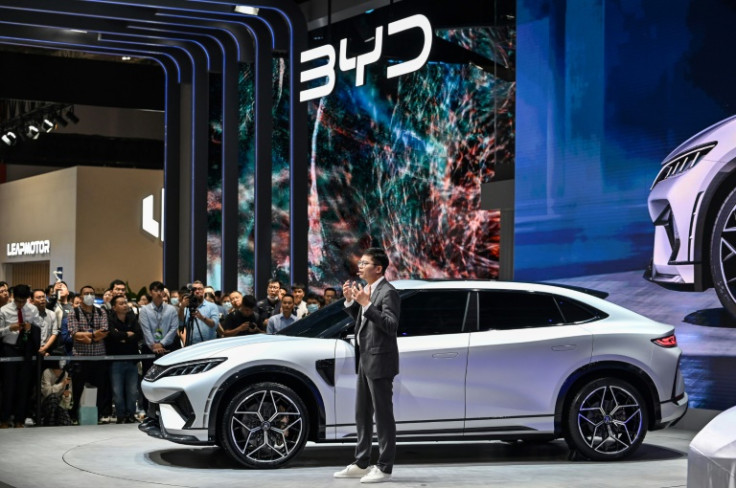What to Know as BYD Recalls Over 115,000 EVs and Hybrids in China for Safety Concerns

KEY POINTS
- The recall includes 44,535 Tang hybrids and 71,248 Yuan Pro EVs due to potential circuit and battery faults.
- China's market regulator said the defects could cause circuit board burnout or reduced battery output.
- BYD, the world's largest EV maker, remains under pressure to maintain quality and safety standards as it expands globally.
Chinese electric vehicle giant BYD has announced the recall of more than 115,000 cars over potential safety concerns, marking a rare setback for the world's largest EV maker amid fierce competition in the domestic market.
According to China's State Administration for Market Regulation (SAMR), the recall affects both hybrid and fully electric models produced between 2015 and 2022. The agency told Reuters that the defects involve component design and manufacturing issues that could affect vehicle performance and safety under certain conditions.
Details of the Recall
SAMR confirmed that 44,535 units of BYD's 2015 Tang hybrid SUVs—produced between 28 March 2015 and 28 July 2017—are being recalled due to component design flaws that could, in extreme cases, cause circuit board burnout.
In addition, 71,248 Yuan Pro electric vehicles manufactured between 6 February 2021 and 5 August 2022 are also affected. Regulators said these models contain manufacturing defects that may reduce battery output, potentially leading to power loss or performance degradation over time.
BYD said it will contact affected owners directly to arrange free inspections and repairs. The company has not yet issued a public statement but is expected to provide updates through official channels.
A Rare Setback for China's EV Leader
The recall marks a notable development for BYD, which has largely avoided major safety controversies even as it rapidly scales up global production. The automaker overtook Tesla in late 2023 as the world's best-selling EV brand and has continued to expand aggressively across Asia, Europe, and Latin America.
Industry analysts say the recall, while relatively small compared with BYD's overall sales volume, underscores the growing scrutiny facing Chinese automakers as competition intensifies and consumers become more sensitive to quality and safety concerns.
Just-Auto reported that the recall mainly affects vehicles sold in the domestic market, though some Tang hybrids were also exported to Southeast Asia and the Middle East. The company has begun notifying affected owners through authorised dealers, with software or hardware replacements expected to start later this month.
'This recall comes at a time when China's EV industry is facing heightened regulatory oversight and a slowdown in sales growth,' Shanghai-based auto analyst Li Yifei told Bloomberg. 'The government is keen to ensure safety and reliability, especially after a string of incidents involving battery fires and software malfunctions among rival brands.'
Competition and Regulation Tighten
China's EV market has been locked in a brutal price war throughout 2024 and 2025, triggered by Tesla's deep discounts and followed by similar moves from Nio, XPeng, and BYD itself. The government has since intervened to discourage unsustainable price-cutting and exaggerated marketing of autonomous driving features, which regulators warned could mislead consumers.
Analysts say the BYD recall could serve as a reality check for the industry. 'It's not just about who can produce the cheapest or most high-tech car,' said automotive consultant Raymond Chiu. 'Long-term credibility will depend on safety, quality control, and after-sales support.'
The timing is also delicate for BYD, which is working to cement its reputation as a global player. The company recently opened plants in Thailand and Hungary and is preparing to launch its first European-made EVs next year.
What It Means for Consumers
For Chinese consumers, the recall reinforces the importance of post-sale service and transparency in the fast-moving EV sector. While BYD remains one of China's most trusted brands, car owners have taken to social media expressing concern and frustration over recurring technical issues in certain models.
One user on Weibo wrote: 'I still love BYD, but they need to fix these issues fast. Safety must come first.' Another commented: 'It's good that the government is strict. It makes all brands improve their quality.'
The recall also highlights how regulators are taking a more proactive stance. SAMR said it will continue to monitor EV safety nationwide to ensure manufacturers 'take responsibility for the full life cycle of their products.'
Outlook
Despite the setback, analysts expect BYD's strong market fundamentals to remain intact. The company continues to dominate China's EV market share, supported by its vertically integrated battery and semiconductor supply chains.
'This recall won't derail BYD's momentum,' said analyst Li Yifei. 'But it serves as a reminder that as Chinese EVs go global, quality assurance will be just as important as innovation.'
© Copyright IBTimes 2025. All rights reserved.





















